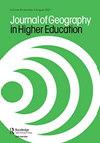Geographic literacy in spain with mental maps
IF 1.8
4区 教育学
Q2 EDUCATION & EDUCATIONAL RESEARCH
引用次数: 4
Abstract
ABSTRACT There is growing interest in assessing the knowledge acquired by students. More often and in diverse disciplines it is necessary to know the level of the students through different types of testing. In the case of teaching of geography in Spain, there is a decrease and loss of such learning for various reasons. The aim of this research is to analyze the literacy in geography of university students in the Grado en Maestro de Educación Primaria (Degree in Elementary Education Teaching) for its possible multiplier effect, since they will be the ones who teach geography to future generations. In order to achieve this, our data source is based on a sample of 629 mental maps from students from four Spanish universities located in different autonomous communities in Spain. The knowledge of the assessed administrative unit was taken into value, but also its location and representation, showing the importance of the where in geography. Results show the inconsistent knowledge of the future teachers depending on the place of residence and which level of the structure of the country they are asked about. In turn, these results reinforce the usefulness of mental maps as an optimal method to assess geographic knowledge.西班牙的地理素养,用头脑中的地图
摘要人们对评估学生所获得的知识越来越感兴趣。更多的时候,在不同的学科中,有必要通过不同类型的测试来了解学生的水平。在西班牙的地理教学中,由于各种原因,这种学习的减少和损失。本研究的目的是分析初级教育硕士学位(Grado en Maestro de Educación Primaria)大学生的地理素养可能产生的乘数效应,因为他们将是向后代教授地理的人。为了实现这一点,我们的数据来源基于来自西班牙不同自治社区的四所西班牙大学的629名学生的心理地图样本。对被评估行政单位的知识进行了评估,但也考虑了其位置和代表性,表明了地理位置的重要性。结果显示,未来教师的知识不一致,这取决于他们的居住地和被问及的国家结构的级别。反过来,这些结果加强了心理地图作为评估地理知识的最佳方法的有用性。
本文章由计算机程序翻译,如有差异,请以英文原文为准。
求助全文
约1分钟内获得全文
求助全文
来源期刊

Journal of Geography in Higher Education
Multiple-
CiteScore
5.80
自引率
9.50%
发文量
29
期刊介绍:
The Journal of Geography in Higher Education ( JGHE) was founded upon the conviction that the development of learning and teaching was vitally important to higher education. It is committed to promote, enhance and share geography learning and teaching in all institutions of higher education throughout the world, and provides a forum for geographers and others, regardless of their specialisms, to discuss common educational interests, to present the results of educational research, and to advocate new ideas.
 求助内容:
求助内容: 应助结果提醒方式:
应助结果提醒方式:


